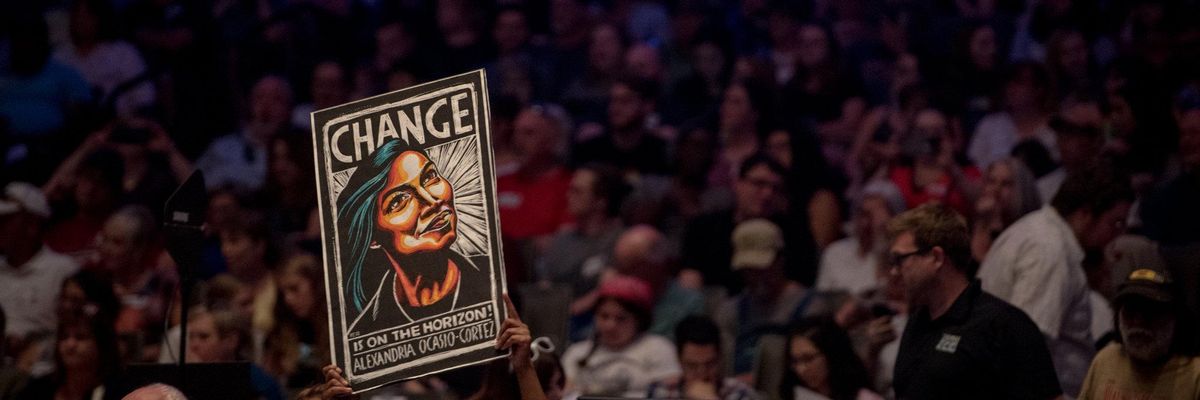In November, several outright Nazis and white supremacists will appear on Republican ballot lines. Arthur Jones, a founder of a neo-Nazi groupcalled the America First Committee, managed to become the Republican nominee for Congress in the heavily Democratic Third District in Illinois. The Republican candidate in California's 11th District, John Fitzgerald, is running on a platform of Holocaust denial. Russell Walker, a Republican statehouse candidate in North Carolina, has said that Jews descend from Satan and that God is a "white supremacist."
Corey Stewart, Virginia's Republican Senate nominee, is a neo-Confederate who pals around with racists, including one of the organizers of the violent "Unite the Right" rally in Charlottesville last year. The longtime Iowa Republican representative Steve King has moved from standard-issue nativist crank to full-on white nationalist; he recently retweeted a neo-Nazi and then refused to delete the tweet, saying, "It's the message, not the messenger."
Clearly, the time has come for a serious national conversation. And so political insiders across the land are asking: Has the Democratic Party become too extreme?
Everywhere you look lately, centrists are panicking about the emboldened left. Moderates, reported Alex Seitz-Wald of NBC News, "are warning that ignoring them will lead the party to disaster in the midterm elections and the 2020 presidential contest." Former Senator Joe Lieberman wrote in The Wall Street Journal that the primary victory of Alexandria Ocasio-Cortez, a member of the Democratic Socialists of America, over Representative Joe Crowley "seems likely to hurt Congress, America and the Democratic Party." James Comey, former director of the F.B.I., tweeted, "Democrats, please, please don't lose your minds and rush to the socialist left," arguing that "America's great middle wants sensible, balanced, ethical leadership."
Though Comey's judgment about things that affect political campaigns is not good, I think he's sincere in wanting Democrats to win in November. But his worry is misplaced. Partly, this is because Democrats are not, in fact, rushing to the socialist left in great numbers. "Overall, it's not really true that the insurgent leftist candidates, like the candidates who are affiliated with the D.S.A. or Bernie Sanders's group, are doing all that well," said Alan Abramowitz, a political scientist at Emory University who specializes in partisan polarization. With many of this year's primary races completed, Crowley is the only Democratic congressional incumbentso far to lose to a challenger from his left. Ocasio-Cortez is a bright, exciting new figure in the Democratic Party, but she doesn't define it.
And even people like Comey -- center-right figures who are momentarily allied with Democrats because they abhor Donald Trump -- should be cheered by the energy that Ocasio-Cortez and others like her are creating. In the midterms, passion is likely to matter more than appeals to an ever-shrinking pool of swing voters, who at any rate tend to be idiosyncratic economic populists rather than the judicious centrists of Beltway imagination.
I'm not wholly unsympathetic to people of good faith who want Democrats to win in November, but who fear that America is more conservative than left-wing activists like to believe. I grew up at a time when Democrats were deeply afraid of liberal overreach. For many of the people who taught me about politics, the debacle of George McGovern's 1972 rout was formative. Its lessons were reinforced by the overwhelming defeat of Michael Dukakis, who was painted as soft on crime and mocked by George H.W. Bush for being a "card-carrying member of the A.C.L.U.," as if concern for civil liberties were shameful. I wasn't old enough to vote when Bill Clinton was first elected, but I remember what a relief it was when he broke the Republicans' 12-year stranglehold on the White House, and how necessary and worthwhile his compromises seemed.
Now, however, Hillary Clinton's defeat has overshadowed McGovern's as the Democratic Party's paradigmatic trauma. There are several lessons you can draw from her loss, some of them conflicting -- some voters saw her as too corporate, others as too liberal. But it's clear that in a polarized electorate, grass-roots fervor and a candidate's charisma matter a lot, and an agenda that seems too modest can be as risky as one that appears overly ambitious.
After all, the economic demands that animate the left are generally quite popular. Though "Medicare For All" means different things to different people, a Kaiser Family Foundation poll from last year found that 62 percent of Americans view it positively. A recent Rasmussen poll found 46 percent of likely voters support a federal jobs guarantee, a more radical proposal that was barely present in American politics a couple of years ago.
Centrists might not think these are good ideas, but they are not wild fantasies; they represent efforts to grapple with the chronic economic insecurity that is the enemy of political stability.
Democrats will not defeat Trump and his increasingly fanatical, revanchist party by promising the restoration of what came before him; the country is desperate for a vision of something better. Whether or not you share that vision, if you truly believe that Trump is a threat to democracy, you should welcome politics that inspire people to come to democracy's rescue.

